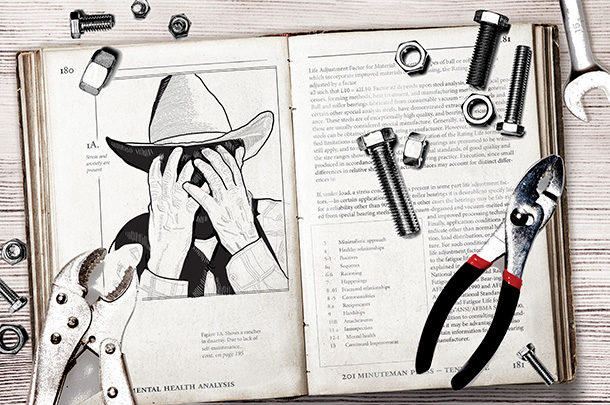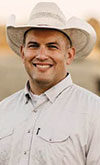Last year, I had the pleasure of being on the That Western Life podcast. I was talking with hosts Katie and Rachel about my mission with my podcast, Ag State of Mind, when Rachel made a reference to a bit by comedian Chris DiStefano.
Chris was talking about his lifelong battle with anxiety – and how the people he is surrounded with could not empathize with him. Being a resident of traditionally middle class, Republican, Staten Island, Chris joked that his friends would only tell him, “Anxiety is for the Democrats.”
I feel like this is exactly how we feel about anxiety and other mental health conditions in agriculture. We feel they are problems for “other people” and not for the strong, independent farmers and ranchers of rural America. Unfortunately, this is a flawed line of thinking. Anxiety (and other mental health issues) is an equal opportunity offender. It does not affect people differently based on race, religion, social class or area of residency. We are all susceptible.
I used to have a line of thinking very similar to Chris. I suppressed and ignored my issues with anxiety for a very long time because I felt it was an issue for other people. I am a strong man who has a great family, great job, live on a beautiful farm with a herd of cows; what do I have to be anxious about?
Through lots of time and effort, I found out there is nothing special about me that made me immune. The issues I’m dealing with as a husband, father, pharmacist and rancher are all too common among others like me. In realizing this, I felt the calling to be a voice for residents of rural America. That if someone like me can struggle – someone who seemingly has it all together – then it is normal and acceptable for others to struggle as well. To give permission to the strong men and women of agriculture to speak out about their struggles as well.
In September 2019, I began releasing my weekly podcast, Ag State of Mind, to help end the stigma around mental health in agriculture. Every week, I talk to a different producer, educator or professional about what they are doing in their communities to help promote a healthy way of living. As a result of the podcast, I have also had many opportunities to speak to ag organizations at meetings and conventions. Throughout the nearly three years of podcasting and speaking, I have learned so much about how best to tackle this subject.
1. Mental health is for everyone
When I began the podcast, I thought I would exclusively talk about mental health disorders (i.e., depression, anxiety). Early on, I had the vivid realization that mental health does not equal mental disorders. Regardless of a diagnosis, every person has and should pay attention to their mental health.
I think of it in regards to a doctor’s visit. Every person, regardless of their cardiac health, has their blood pressure taken when they go for a doctor’s appointment. We should treat our mental health the same way. We shouldn’t wait for a crisis (like a heart attack, for comparison to cardiac health) to pay attention to our mental health. We need to take the proactive approach.
2. We need to see ourselves as assets
Every farm or ranch has a balance sheet with a list of assets and liabilities. If we want those assets to retain as much value and last for as long as possible, there needs to be a certain amount of maintenance done. We need to change the oil on our trucks and tractors, vaccinate the cow herd and fertilize the fields. We must begin to see ourselves in the same sort of way. In fact, we need to see ourselves as more important than the other assets on our operation. If we do not treat ourselves at least as well as the other assets, we will not be able to perform our duties effectively nor efficiently. We must have maintenance on ourselves.
That maintenance can look different for everyone. I have two rules for myself I like to apply to make sure I’m getting the maintenance I need.
Rule of 5
When things just don’t seem to be functioning properly, I realize that it’s time for a break. That break can be however long or short it needs to be. It can last five minutes, five hours or five days, just so long as it is long enough for you to recharge how you need to. I have found the increase of efficiency post-break more than makes up for the loss of time during the break.
Rule of 2
This rule is regarding the relationship with my wife. A big part of being mentally healthy is to have a strong and thriving relationship with your spouse. To help ensure this, we make sure we go on a date night once every two weeks. This isn’t always a fancy dinner – in fact, it rarely is. Sometimes it’s just us hopping on the side-by-side or horseback and going for a ride. We want to remember why we decided to get married in the first place.
Two times a year, we get out of town for a weekend, and every two years we get out of town for an entire week – without children. We find this is an incredible way for us to stay connected.
Now, I know some of you are going to say you’re too busy to make this happen. I thought so myself once upon a time. The key is planning. We don’t take these trips in April while we are calving, June when we are in the hay, nor July when it’s fair time. Instead, we find those small windows of time that are less busy and stick the trips in our calendar months in advance, and then we make them non-negotiable. It’s tough, and takes lots of planning and logistics, but it’s worth it.
These are just some of the many things I have found are helpful for me through my mental health journey. I encourage everyone to take a closer look at their own mental health and find ways you can be proactive.










